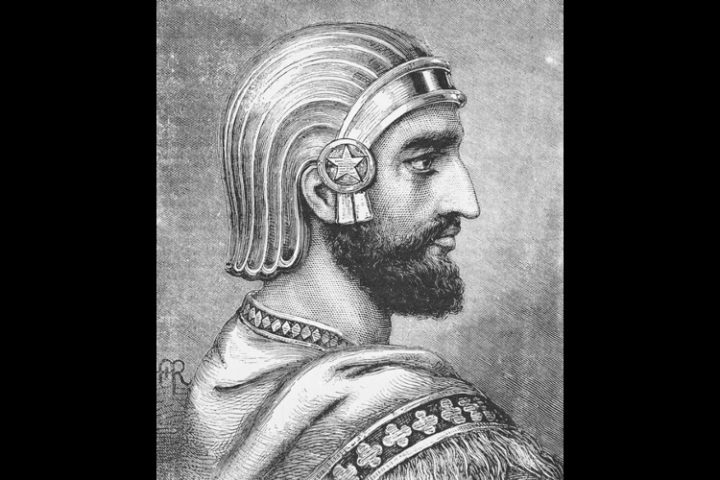
On this day in 539 B.C. the armies of Persian emperor Cyrus the Great marched into Babylon without facing any opposition, conquering Babylon and bringing to an end the Neo-Babylonian empire.
This is all very interesting, but there’s more to this story than commemorating Cyrus’s victory over Babylon. Consider the following very contemporary and very curious aspect of the life of Cyrus the Great.
Following the 45th president’s announcement in 2018 that the U.S. embassy in Israel would move from Tel Aviv to Jerusalem, Israeli Prime Minister Benjamin Netanyahu remarked, “I want to tell you that the Jewish people have a long memory, so we remember the proclamation of the great king, Cyrus the Great, Persian king 2,500 years ago. He proclaimed that the Jewish exiles in Babylon could come back and rebuild our Temple in Jerusalem.”
Netanyahu suggested that, like Cyrus, Trump was a historic leader who supported Israel’s interests. This comparison stirred significant controversy and debate, both domestically and internationally.
Benjamin Netanyahu was the most noteworthy, but he was not the first, to make the Trump-Cyrus comparison.
Lance Wallnau, an evangelical author and speaker, once said, “I believe the 45th president is meant to be an Isaiah 45 Cyrus,” who will “restore the crumbling walls that separate us from cultural collapse.”
Donald Trump is a 21st century Cyrus the Great? Netanyahu and Wallnau among others thought so. Let’s look a little closer at the comparison.
While the comparison between Donald Trump and the revered Persian emperor may seem far-fetched at first glance, it’s worth exploring the parallels in their leadership styles and how both figures disrupted the status quo in their respective eras.
Cyrus the Great, who reigned from 559 to 530 B.C., is celebrated for his remarkable achievements in unifying the vast Persian Empire, advocating for religious tolerance, and pioneering the concept of human rights. His name is synonymous with leadership that transcends time and cultural boundaries. Likewise, Donald Trump, the 45th president of the United States, made a significant impact during his tenure and left a legacy that continues to divide opinion.
First and foremost, both Cyrus and Trump share an innate ability to connect with their respective populaces. Cyrus was known for his capacity to win the trust and loyalty of his subjects through his amiable disposition and willingness to listen. In a parallel vein, Trump’s unscripted communication style, whether through Twitter or his inimitable rallies, resonated with a segment of the American population that felt unheard by the political establishment. The way they connected with their supporters created a unique aura of leadership that defied traditional norms.
One of the most striking comparisons between Cyrus and Trump is their commitment to challenging the establishment and upending the existing order. Cyrus famously overthrew the Median Empire to establish the Persian Empire, a feat that required exceptional strategic prowess and a profound belief in his own vision. Similarly, Trump’s 2016 electoral victory was seen by many as a rebuke of the political establishment. His unapologetic approach to governance disrupted the traditional, entrenched norms of Washington, D.C., and provided a fresh perspective to a significant portion of the American electorate.
Moreover, both leaders displayed a strong commitment to economic prosperity. Cyrus implemented a currency system and promoted trade and economic growth within his empire. He was known for embracing the wisdom of different cultures and their economic practices, a policy that significantly contributed to the empire’s success. In a similar vein, Trump’s presidency was marked by a focus on economic policies aimed at boosting domestic growth. Tax cuts, deregulation, and a commitment to renegotiating international trade deals were hallmarks of his economic agenda. Whether it was through the historic low unemployment rates or soaring stock markets, his policies undeniably had an impact on the U.S. economy.
While the comparison between Cyrus and Trump is not without its merits, it’s essential to recognize their differences. Cyrus was celebrated for his commitment to religious tolerance and his famous decree that allowed the Jewish people to return to their homeland and rebuild the Temple in Jerusalem. Trump’s approach to religious matters was quite distinct, with a focus on religious freedom and his pro-life stance winning him the support of conservative Christian groups.
Another crucial distinction lies in their approaches to international relations. Cyrus was celebrated for his diplomacy and ability to rule an ethnically diverse empire, while Trump’s foreign policy was characterized by a more confrontational stance towards countries like China and Iran.
There are those who consider the comparison between Trump and Cyrus to be more hysterical than historical. Writing in Red Letter Christian, Rachel Ophoff comes down decidedly on the side of the former:
I believe that the Cyrus Prophecy over Donald Trump is a mass hysterical reaction to a fictitious assumption, just like the panic over War of the Worlds. It’s just that everyone back then was hoping and praying it wasn’t real.
The bottom line, folks, is that any prophecy spoken or written over Donald Trump isn’t biblical.
In conclusion, while the comparisons between Donald Trump and Cyrus the Great may seem unconventional, they both shared a unique ability to connect with their supporters, disrupt established norms, and prioritize economic prosperity. These commonalities, combined with their distinct approaches to religious matters and foreign policy, offer an interesting lens through which to understand their leadership styles. Ultimately, their historical contexts and legacies are markedly different, but it is a testament to their enduring influence that they are subjects of comparison in the first place.
For those of you interested in reading about Cyrus’s conquest of Babylon, the story is so strange and a real page-turner! You can find the story recounted by Herodotus in his Histories.



